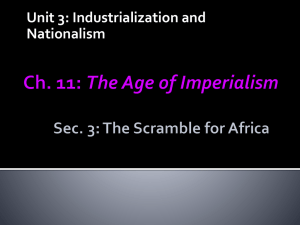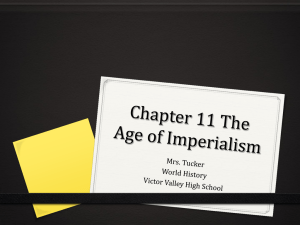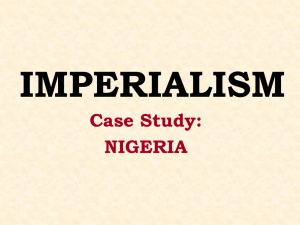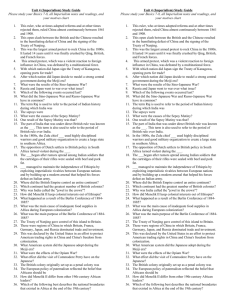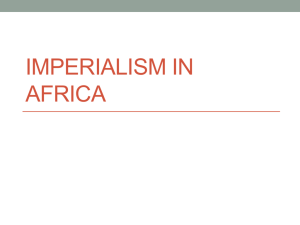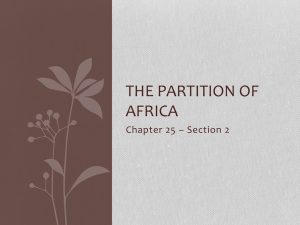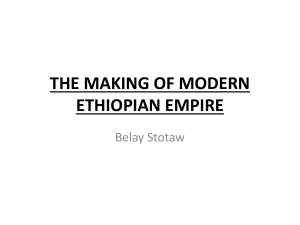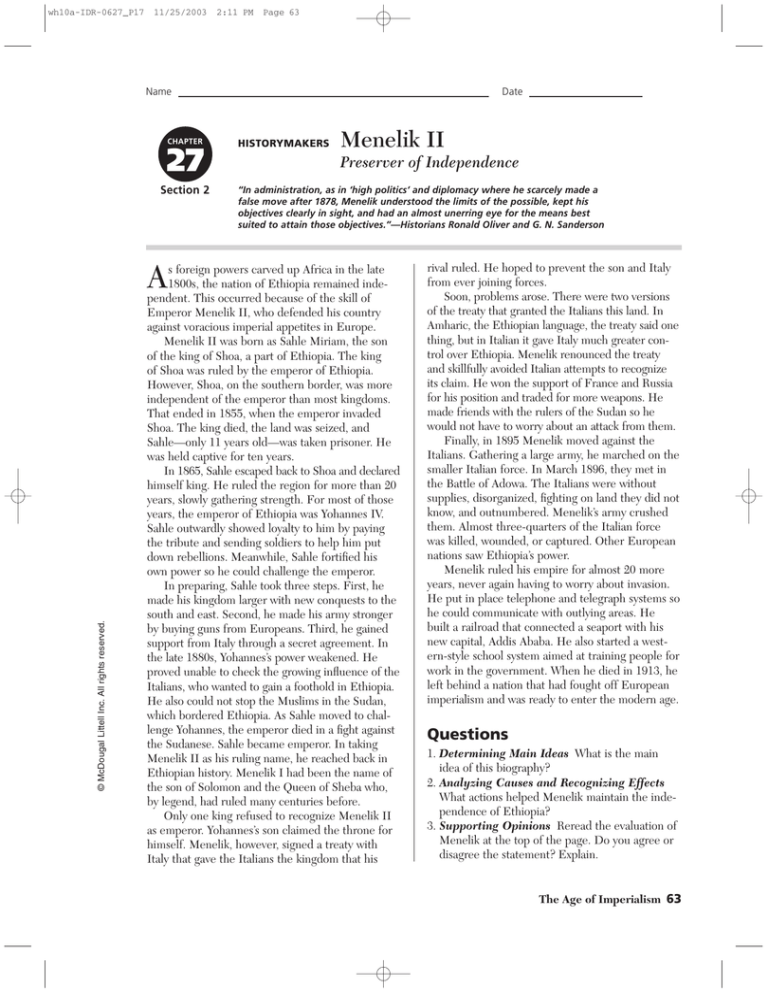
wh10a-IDR-0627_P17
11/25/2003
2:11 PM
Page 63
Name
CHAPTER
27
Section 2
© McDougal Littell Inc. All rights reserved.
A
Date
HISTORYMAKERS
Menelik II
Preserver of Independence
“In administration, as in ‘high politics’ and diplomacy where he scarcely made a
false move after 1878, Menelik understood the limits of the possible, kept his
objectives clearly in sight, and had an almost unerring eye for the means best
suited to attain those objectives.”—Historians Ronald Oliver and G. N. Sanderson
s foreign powers carved up Africa in the late
1800s, the nation of Ethiopia remained independent. This occurred because of the skill of
Emperor Menelik II, who defended his country
against voracious imperial appetites in Europe.
Menelik II was born as Sahle Miriam, the son
of the king of Shoa, a part of Ethiopia. The king
of Shoa was ruled by the emperor of Ethiopia.
However, Shoa, on the southern border, was more
independent of the emperor than most kingdoms.
That ended in 1855, when the emperor invaded
Shoa. The king died, the land was seized, and
Sahle—only 11 years old—was taken prisoner. He
was held captive for ten years.
In 1865, Sahle escaped back to Shoa and declared
himself king. He ruled the region for more than 20
years, slowly gathering strength. For most of those
years, the emperor of Ethiopia was Yohannes IV.
Sahle outwardly showed loyalty to him by paying
the tribute and sending soldiers to help him put
down rebellions. Meanwhile, Sahle fortified his
own power so he could challenge the emperor.
In preparing, Sahle took three steps. First, he
made his kingdom larger with new conquests to the
south and east. Second, he made his army stronger
by buying guns from Europeans. Third, he gained
support from Italy through a secret agreement. In
the late 1880s, Yohannes’s power weakened. He
proved unable to check the growing influence of the
Italians, who wanted to gain a foothold in Ethiopia.
He also could not stop the Muslims in the Sudan,
which bordered Ethiopia. As Sahle moved to challenge Yohannes, the emperor died in a fight against
the Sudanese. Sahle became emperor. In taking
Menelik II as his ruling name, he reached back in
Ethiopian history. Menelik I had been the name of
the son of Solomon and the Queen of Sheba who,
by legend, had ruled many centuries before.
Only one king refused to recognize Menelik II
as emperor. Yohannes’s son claimed the throne for
himself. Menelik, however, signed a treaty with
Italy that gave the Italians the kingdom that his
rival ruled. He hoped to prevent the son and Italy
from ever joining forces.
Soon, problems arose. There were two versions
of the treaty that granted the Italians this land. In
Amharic, the Ethiopian language, the treaty said one
thing, but in Italian it gave Italy much greater control over Ethiopia. Menelik renounced the treaty
and skillfully avoided Italian attempts to recognize
its claim. He won the support of France and Russia
for his position and traded for more weapons. He
made friends with the rulers of the Sudan so he
would not have to worry about an attack from them.
Finally, in 1895 Menelik moved against the
Italians. Gathering a large army, he marched on the
smaller Italian force. In March 1896, they met in
the Battle of Adowa. The Italians were without
supplies, disorganized, fighting on land they did not
know, and outnumbered. Menelik’s army crushed
them. Almost three-quarters of the Italian force
was killed, wounded, or captured. Other European
nations saw Ethiopia’s power.
Menelik ruled his empire for almost 20 more
years, never again having to worry about invasion.
He put in place telephone and telegraph systems so
he could communicate with outlying areas. He
built a railroad that connected a seaport with his
new capital, Addis Ababa. He also started a western-style school system aimed at training people for
work in the government. When he died in 1913, he
left behind a nation that had fought off European
imperialism and was ready to enter the modern age.
Questions
1. Determining Main Ideas What is the main
idea of this biography?
2. Analyzing Causes and Recognizing Effects
What actions helped Menelik maintain the independence of Ethiopia?
3. Supporting Opinions Reread the evaluation of
Menelik at the top of the page. Do you agree or
disagree the statement? Explain.
The Age of Imperialism 63

